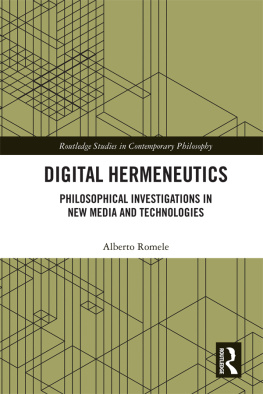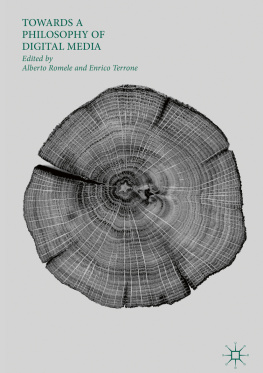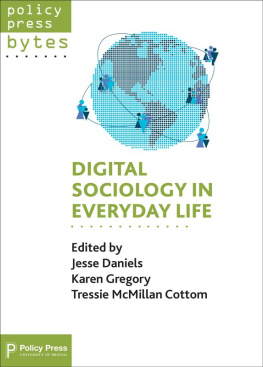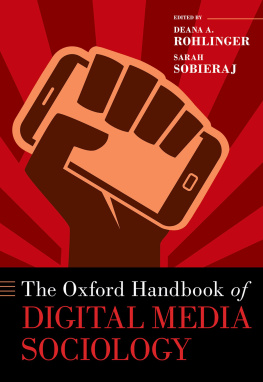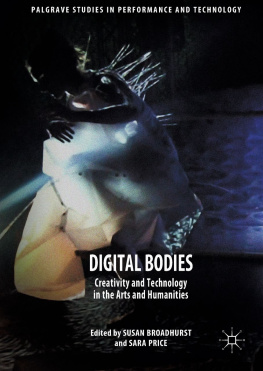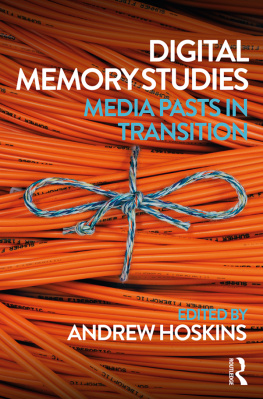Digital Hermeneutics
Digital Hermeneutics is a must-read for all interested in understanding the role of the human interpreter as well as the part played by technologies and the digital. The author presents new and refreshing ideas that will engage and provoke academics from both humanities and the social sciences.
Jan Kyrre Berg Friis, University of Copenhagen, Denmark
This is the first monograph to develop a hermeneutic approach to the digitalas both a technological milieu and a cultural phenomenon. While philosophical in its orientation, the book covers a wide body of literature across science and technology studies, media studies, digital humanities, digital sociology, cognitive science, and the study of artificial intelligence.
In the first part of the book, the author formulates an epistemological thesis according to which the virtual never ended. Although the frontiers between the real and the virtual are certainly more porous today, they still exist and endure. In the books second part, the author offers an ontological reflection on emerging digital technologies as imaginative machines. He introduces the concept of emagination, arguing that human schematizations are always externalized into technologies, and that human imagination has its analog in the digital dynamics of articulation between databases and algorithms. The author takes an ethical and political stance in the concluding chapter. He resorts to the notion of digital habitus for claiming that within the digital we are repeatedly being reconducted to an oversimplified image and understanding of ourselves.
Digital Hermeneutics will be of interest to scholars across a wide range of disciplines, including those working on philosophy of technology, hermeneutics, science and technology studies, media studies, and the digital humanities.
Alberto Romele is Associate Professor of Philosophy of Technology at Lille Catholic University, France. He is the co-editor of Towards a Philosophy of Digital Media (2018).
Routledge Studies in Contemporary Philosophy
Philosophical Perspectives on Moral and Civic Education
Shaping Citizens and Their Schools
Edited by Colin Macleod and Christine Tappolet
Explanation in Action Theory and Historiography
Causal and Teleological Approaches
Edited by Gunnar Schumann
Spatial Senses
Philosophy of Perception in an Age of Science
Edited by Tony Cheng, Ophelia Deroy, and Charles Spence
Transhumanism and Nature
A Critique of Technoscience
Robert Frodeman
Freedom to Care
Liberalism, Dependency Care, and Culture
Asha Bhandary
Moved by Machines
Performance Metaphors and Philosophy of Technology
Mark Coeckelbergh
Responses to Naturalism
Critical Perspectives from Idealism and Pragmatism
Edited by Paul Giladi
Digital Hermeneutics
Philosophical Investigations in New Media and Technologies
Alberto Romele
For more information about this series, please visit: www.routledge.com/Routledge-Studies-in-Contemporary-Philosophy/book-series/SE0720
Digital Hermeneutics
Philosophical Investigations in New Media and Technologies
Alberto Romele

First published 2020
by Routledge
52 Vanderbilt Avenue, New York, NY 10017
and by Routledge
2 Park Square, Milton Park, Abingdon, Oxon OX14 4RN
Routledge is an imprint of the Taylor & Francis Group, an informa business
2020 Taylor & Francis
The right of Alberto Romele to be identified as author of this work has been asserted by him/her in accordance with sections 77 and 78 of the Copyright, Designs and Patents Act 1988.
All rights reserved. No part of this book may be reprinted or reproduced or utilised in any form or by any electronic, mechanical, or other means, now known or hereafter invented, including photocopying and recording, or in any information storage or retrieval system, without permission in writing from the publishers.
Trademark notice: Product or corporate names may be trademarks or registered trademarks, and are used only for identification and explanation without intent to infringe.
Library of Congress Cataloging-in-Publication Data
A catalog record for this title has been requested
ISBN: 978-0-367-35366-7 (hbk)
ISBN: 978-0-429-33189-3 (ebk)
Typeset in Sabon
by Apex CoVantage, LLC
Contents
PART 1
The Virtual Never Ended
PART 2
Emagination
are a reworked version of Romele, A. 2019. Towards a Posthuman Hermeneutics. Journal of Posthuman Studies 3(1): 4559.
I started thinking about this book in Italy. I wrote it largely in Portugal and I finished it in France. I decided to write it in English, which is my no mans land. On this long journey, I met many people who taught, helped, and supported me in different ways. I would like to especially thank Mario Lombardo, Jos De Mul, Marta Severo, Christian Berner, Ernst Wolff, Marcel Hnaff, Stefano Gualeni, Jean-Claude Gens, Bruno Bachimont, Johann Michel, Rossana de Angelis, Franck Cormerais, Paolo Furia, Camilla Emmenegger, Francesco Gallino, Claudio Paravati, Daniele Gorgone, Enrico Terrone, Dario Rodighiero, Franois-David Sebbah, Luca Possati, Wessel Reijers, Mark Coeckelbergh, and Maurizio Ferraris.
I would like to express my gratitude to my former postdoctoral supervisor Paulo Tunhas and my old colleagues at the Institute of Philosophy of the University of Porto: Jos Meirinhos, Eleonora Lombardo, Joo Rebalde, Jos Higuera, Celia Lpez, Paula Silva, Isabel Marques, Sofia Miguens, and Mattia Riccardi. My heartfelt thanks also to the Fundaao para a Cincia e a Tecnologia that financed my postdoctoral researches (grant number SFRH/BPD/93297/2013). At the ETHICS (EA-7446) lab of the Catholic University of Lille, I have appreciated the tremendous support given to me by my new colleagues, in particular, Nicolas Vaillant, Malik Bozzo-Rey, Alain Loute, and the members of the research chair Ethics, technology, and transhumanisms: David Doat, Benjamin Bourcier, Stanislas Deprez, Paul Jorion, Jacques Printz, Vincent Calais, Marie-des-Neiges Ruffo, Gabriel Dorthe, Fernand Doridot, and Franck Damour. Jyotsna Massey and Sara Testa helped me a lot with the English grammar.
I am also grateful to all my friends, especially Alessandro, Mattia, Ilya, Davide, Enzo, Marco, Laura, Alice, Elisa, Sebastian, Eleonora, and Sara. I owe everything to my family of origin: my parents Nadia and Luigi, and my sister, Elena, who gave me two fantastic nieces, Lavinia and Beatrice, a newborn nephew, Tommaso, and even an acceptable brother-in-law, Michele. Finally, it would not be enough to thank the family of which I am now part of, Marta, Matteo, Carlo, and Clara. I have no words to describe the joy they give me every day.
I want to introduce this book with a crude confession. When I started to conduct research on hermeneutics and digital technologies, my intentions were mostly destructive. In a previous book of mine (Romele 2013a), a small part of which has been published in English (Romele 2014), I had already worked on a deconstruction of philosophical hermeneutics from above. That work was built on Gadamers rehabilitation of the Augustinian notion of inner word (verbum in corde

